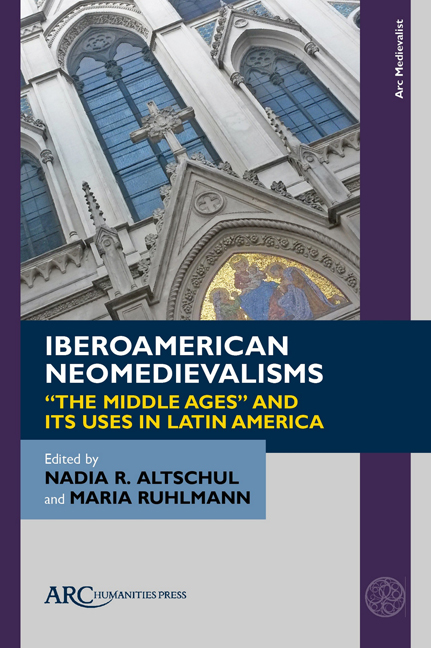Book contents
- Frontmatter
- Contents
- List of Illustrations
- Chapter 1 Postcolonizing Neomedievalism:An Introduction
- Chapter 2 The Criollo Invention of the Middle Ages
- Chapter 3 A Militant and Peasant-Based Medieval History in Brazil: Fanning the Spark of Hope
- Chapter 4 Neomedievalism and the Hagiography of Valdemiro Santiago: Neopentecostal Sanctification
- Chapter 5 The “Middle Ages” in the Brazilian Presidential Elections of 2018: The Left, the Right, and the Centre
- Chapter 6 Averroes in Mid-Colonial and Inter-Imperial Cordoba
- Chapter 7 Hypermedievalizing and De-Medievalizing Dante: Leopoldo Lugones’s and Jorge Luis Borges’s Rewritings of Inferno V
- Chapter 8 Borges and Kennings
- Chapter 9 Memory, Desire, and Sexual Identity in Manuel Mujica Lainez’s El unicornio
- Chapter 10 Rewriting and Visualizing the Cid: The Reconstruction of Medieval Gender and Race in Argentinian Graphic Novels
Chapter 3 - A Militant and Peasant-Based Medieval History in Brazil: Fanning the Spark of Hope
Published online by Cambridge University Press: 18 November 2023
- Frontmatter
- Contents
- List of Illustrations
- Chapter 1 Postcolonizing Neomedievalism:An Introduction
- Chapter 2 The Criollo Invention of the Middle Ages
- Chapter 3 A Militant and Peasant-Based Medieval History in Brazil: Fanning the Spark of Hope
- Chapter 4 Neomedievalism and the Hagiography of Valdemiro Santiago: Neopentecostal Sanctification
- Chapter 5 The “Middle Ages” in the Brazilian Presidential Elections of 2018: The Left, the Right, and the Centre
- Chapter 6 Averroes in Mid-Colonial and Inter-Imperial Cordoba
- Chapter 7 Hypermedievalizing and De-Medievalizing Dante: Leopoldo Lugones’s and Jorge Luis Borges’s Rewritings of Inferno V
- Chapter 8 Borges and Kennings
- Chapter 9 Memory, Desire, and Sexual Identity in Manuel Mujica Lainez’s El unicornio
- Chapter 10 Rewriting and Visualizing the Cid: The Reconstruction of Medieval Gender and Race in Argentinian Graphic Novels
Summary
It is time for professional historians to renounce the solitary comforts of our offices and promote a history that engages with social realities and can be a tool for political intervention in the present, as well as a beacon for the future. My appeal is directed especially to those who address remote societies in space or in time: to promote a type of history that is engaged in the social struggles of the present and to preserve our field against current trends that systematically and progressively threaten its substance, density, meaning and raison d’être. Despite personal devotion to past temporalities, I contend that historians should invest all their efforts and passion into building an alternative future to the dark approaching horizon that is being shaped, a product of the swift degradation of our living conditions. I likewise contend that this attitude necessarily requires the promotion of a militant and anti-capitalist history.
I will start by making clear a known point. Our reigning proposition commands historians to practise our craft in a rigorous manner. Yet an implicit side of that proposition is that our craft must be unpretentious and aseptic, a so-called technical knowledge purified of political passion and inclination. This implicit belief is unshaken despite our knowledge that all established scholars are biased. Some may be openly pro-establishment, denouncing “conspiracies,” and supporting, for instance, the so-called clash of civilizations or the many kinds of “historical revisionism.” These might in fact be worth a measure of respect for doing this openly. Many, as examined by Josep Fontana and Julio Aróstegui, do it implicitly, hiding from readers the epistemological and theoretical perspectives that shape their intellectual production. Moreover, almost all involved find it easier to denounce as ideological only history that is explicitly anti-hegemonic. The proposition of this chapter is therefore not new or “alternative,” although it might not be as fashionable as it once was, at least not since the celebration of the triumph of capitalism and Francis Fukuyama's so-called end of history. In order to produce a history that offers an alternative tomorrow—an alternative to the “wasteland” that is our ongoing future—the rigorous practice of the craft is a sine qua non. This remark should assuage the purists.
- Type
- Chapter
- Information
- Iberoamerican NeomedievalismsThe Middle Ages' and Its Uses in Latin America, pp. 41 - 62Publisher: Amsterdam University PressPrint publication year: 2023

